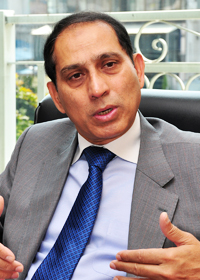Pakistani envoy slams abuse of freedom of speech
The Pakistani Ambassador to Korea criticized those who abuse freedom of expression to derogate Islam and those who believe in it.
Referring to a recent controversy surrounding an anti-Islam film, Ambassador Shaukat Ali Mukadam said, “In Islam, we do not criticize others. We respect all other religions. We don’t expect other religions to make caricatures or movies which are derogatory of life and teaching of holy Prophet.”
During an interview with The Korea Times in his office, Wednesday, the ambassador also criticized his Railways Minister Ghulam Ahmed Bilour for offering a bounty of $100,000 for the death of the filmmaker who made the film.
“He is in an official position, and he should have not made (such a statement),” the envoy said, joining the Pakistani government, which has disowned the bounty.
The minister’s statement came on Sept. 22, one day after violent protests in Pakistan against the anti-Islam video made in the United States lead to at least 20 deaths.
“I will pay whoever kills the makers of this video $100,000,” Bilour said.
He even asked the Taliban and al-Qaeda to help in getting the filmmaker’s head.
The United States described the minister’s remarks as “inflammatory and inappropriate,” and Islamabad is anxious about its deteriorating relations with Washington.
Moreover, Bilour isn’t alone.
On Monday, Former Pakistani lawmaker Ikramullah Shahid said he’d pay $200,000 to anyone who kills the filmmaker.
The video clip from “Innocence of Muslims” released through Youtube cost many lives. The first victims were four American diplomats posted in Libya, including ambassador Christopher Stevens.
The film desecrating the Muslim prophet was initially cited as a motivation for the incident. A full investigation by the Libyan and the U.S. government is still underway.
The producer of the film is Nakoula Basseley Nakoula, an Egyptian-born U.S. resident with Coptic Christian faith. He used the pseudonym “Sam Bacile” on Youtube.
The railways minister’s announcement created quite a sensation in Pakistan and the Muslim world. However, the government and the party he belongs to disowned his bounty.
Pakistan’s Prime Minister’s Office held a press meeting immediately after his announcement, disassociating from the minister.
“PM office said ‘this is a personal statement. It’s not a statement of the government,’” the ambassador Mukadam said. Likewise, the Awami National Party to which Bilour belongs and which is a coalition partner with the government of President Asif Ali Zardari, made a similar stance, disowning his bounty offer.
Now, a big question is his future.
The ambassador said there would be a talk between President Zardari and Bilour when the president came back from New York where the United Nations General Assembly took place.
News reports speculated quoting an anonymous source among the Pakistani delegation to New York that the minister will eventually be removed from his post. So far, the Pakistani government has kept silent about Bilour’s future.
At the 67th U.N. General Assembly last week, the Pakistani president called international leaders for discouraging abuse of freedom of speech that make nations and religious groups put up each other.
Ambassador Mukadam echoed the president. “This sort of expression of freedom is not helpful in creating harmony in different religions and people.”
He continued, “there are obligations when you exercise your rights. You’re allowed to express yourself, but you shouldn’t disturb others.”
The ambassador said the initial public outrage in Pakistan was getting out of control.
“Now, it’s getting better,” but the government could not help but restrict the access to the video on Youtube. The U.S. diplomatic missions in Pakistan were in extreme in danger, and the government had to dispatch armed security forces to the American Embassy in Islamabad and consulate general offices across the country.
“The situation was much worse than the cartoon,” he said, referring to a Danish cartoon controversy which occurred in September 2005.
Twelve editorial cartoons depicting Muslim Prophet in a blasphemous way flared up the international controversy.
The Muslim world reacted to the cartoons with indignation. Muslims held protests, some of which got violent resulting in deaths. The Danish Embassy in Pakistan was bombed, and the Danish Embassy in Syria, Lebanon and Iran was torched. Protesters burnt flags in Gaza City. <The Korea Times/Kim Se-jeong>


























































